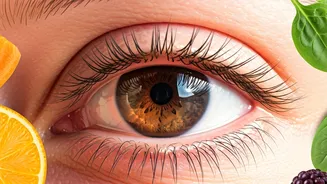Vitamin C's Protective Power
Vitamin C, a well-known antioxidant, significantly benefits eye health. This powerful nutrient helps protect the eyes from damage caused by free radicals,
unstable molecules that can harm cells. Found abundantly in fruits and vegetables, Vitamin C contributes to the formation of collagen, a crucial component of the eye's cornea. By incorporating vitamin C-rich foods into your diet, you fortify your eyes against oxidative stress, supporting overall visual function. Furthermore, the antioxidant properties of Vitamin C may help reduce the risk of age-related macular degeneration (AMD) and cataracts, two common eye conditions. Consuming foods such as citrus fruits, berries, and bell peppers can ensure your eyes receive adequate protection.
The Importance of Vitamin A
Vitamin A is essential for maintaining healthy vision, especially in low-light conditions. It is a key component of rhodopsin, a pigment in the retina that enables vision in dim light. A deficiency in Vitamin A can lead to night blindness and, in severe cases, other serious eye problems. Vitamin A also supports the health of the cornea, the clear front surface of the eye, and protects the conjunctiva, the membrane that covers the white part of the eye and the inside of the eyelids. Good sources of Vitamin A include liver, dairy products, and brightly colored fruits and vegetables like carrots and sweet potatoes. Adequate Vitamin A intake ensures optimal retinal function and helps prevent visual impairments.
Vitamin E for Eye Health
Vitamin E, another potent antioxidant, shields the eyes from damage caused by free radicals. It protects the cells of the eye from oxidative stress, contributing to the prevention of age-related eye diseases. By neutralizing these harmful molecules, Vitamin E helps maintain the health of the lens and retina. Studies suggest that Vitamin E, in combination with other antioxidants, may reduce the risk of developing cataracts and AMD. Including foods rich in Vitamin E in your diet, such as nuts, seeds, and vegetable oils, can significantly contribute to preserving eye health and promoting long-term visual well-being. Regular intake helps safeguard the delicate structures within the eyes.
Omega-3 Fatty Acids Benefits
Omega-3 fatty acids, particularly DHA (docosahexaenoic acid), play a vital role in maintaining healthy vision. DHA is a major structural component of the retina, the light-sensitive tissue at the back of the eye. Adequate DHA intake supports retinal function and can contribute to the prevention of dry eye syndrome. Research suggests that consuming Omega-3 fatty acids may reduce the risk of developing AMD and other eye conditions. Foods rich in Omega-3, such as fatty fish (salmon, tuna), flaxseeds, and walnuts, are beneficial for eye health. Ensuring sufficient Omega-3 intake promotes overall visual function and reduces the risk of eye-related ailments.
The Power of Flavonoids
Flavonoids, a group of plant compounds with antioxidant and anti-inflammatory properties, offer significant benefits for eye health. These compounds help protect the eyes from oxidative damage and can reduce the risk of age-related eye diseases. Flavonoids can improve blood flow to the eyes, ensuring that the tissues receive adequate oxygen and nutrients. Foods rich in flavonoids include berries, citrus fruits, and dark chocolate. Regular consumption of flavonoid-rich foods can support the health of the blood vessels in the eyes, thus promoting overall visual health and protecting against potential damage. Incorporating these foods helps to strengthen the body's defenses.
Carotenoids for Protection
Carotenoids, particularly lutein and zeaxanthin, are essential for eye health. These pigments act as antioxidants, protecting the eyes from harmful blue light and oxidative stress. Lutein and zeaxanthin are concentrated in the macula, the central part of the retina, and help filter out blue light, which can damage the eyes over time. Studies indicate that a diet rich in lutein and zeaxanthin can reduce the risk of AMD and cataracts. Found in leafy green vegetables, corn, and eggs, these carotenoids contribute to optimal visual function and protection. Including these nutrients in your daily diet is a proactive approach to maintaining long-term eye health.
Regular Eye Check-ups
Besides nutrition, regular eye check-ups are crucial for maintaining healthy vision. These check-ups allow eye care professionals to identify potential problems early, before they progress and cause significant damage. During an eye exam, doctors can assess overall eye health, check for signs of common eye diseases like glaucoma and cataracts, and evaluate the need for vision correction. Early detection and intervention are often key to preventing vision loss. Following a schedule set by an ophthalmologist or optometrist, individuals can ensure their eyes are in the best possible condition. These routine check-ups are a proactive step towards preserving long-term eye health.
















